人教版英语必修一教案
人教版高中英语必修1教案5篇
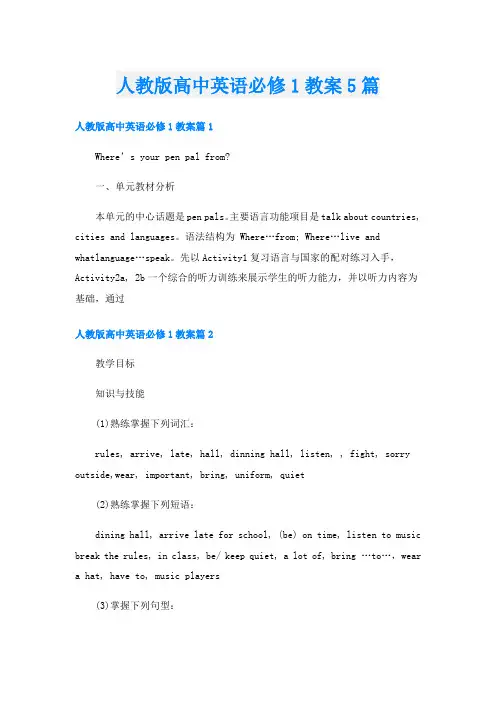
人教版高中英语必修1教案5篇人教版高中英语必修1教案篇1Where’s your pen pal from?一、单元教材分析本单元的中心话题是pen pals。
主要语言功能项目是talk about countries, cities and languages。
语法结构为 Where…from; Where…live and whatlanguage…speak。
先以Activity1复习语言与国家的配对练习入手,Activity2a, 2b一个综合的听力训练来展示学生的听力能力,并以听力内容为基础,通过人教版高中英语必修1教案篇2教学目标知识与技能(1)熟练掌握下列词汇:rules, arrive, late, hall, dinning hall, listen, , fight, sorry outside,wear, important, bring, uniform, quiet(2)熟练掌握下列短语:dining hall, arrive late for school, (be) on time, listen to music break the rules, in class, be/ keep quiet, a lot of, bring …to…,weara hat, have to, music players(3)掌握下列句型:1. Dont eat in class.2. You must be on time.3. Eat in the dining hall.4. 正确使用情态动词can, can’t——Can we wear a hat in school?——Yes, we can./No, we can’t.5. 能正确使用have to 和 must 谈论规章制度We must be on time/ We also have to be quiet in the library. 教学重难点重点:1) 肯定祈使句是省略掉主语的原形动词开头;2) 否定祈使句则是在肯定祈使句前加上“don’t”。
英语人教版高中必修一(新课标)教案Unit1 Reading for Writing 教案
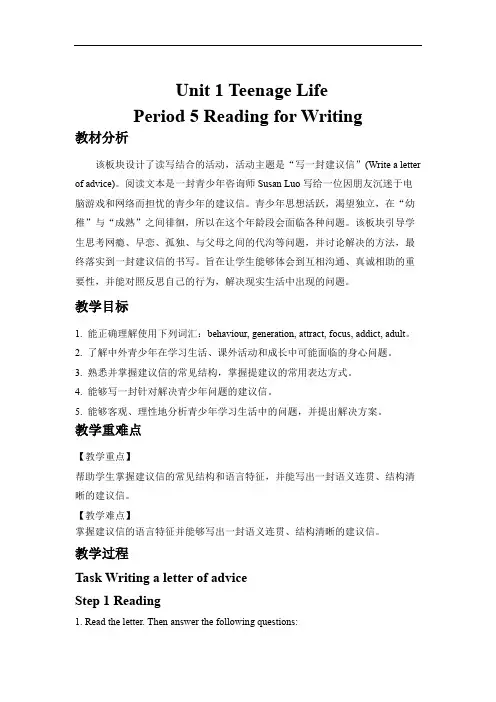
Unit 1 Teenage LifePeriod 5 Reading for Writing教材分析该板块设计了读写结合的活动,活动主题是“写一封建议信”(Write a letter of advice)。
阅读文本是一封青少年咨询师Susan Luo写给一位因朋友沉迷于电脑游戏和网络而担忧的青少年的建议信。
青少年思想活跃,渴望独立,在“幼稚”与“成熟”之间徘徊,所以在这个年龄段会面临各种问题。
该板块引导学生思考网瘾、早恋、孤独、与父母之间的代沟等问题,并讨论解决的方法,最终落实到一封建议信的书写。
旨在让学生能够体会到互相沟通、真诚相助的重要性,并能对照反思自己的行为,解决现实生活中出现的问题。
教学目标1. 能正确理解使用下列词汇:behaviour, generation, attract, focus, addict, adult。
2. 了解中外青少年在学习生活、课外活动和成长中可能面临的身心问题。
3. 熟悉并掌握建议信的常见结构,掌握提建议的常用表达方式。
4. 能够写一封针对解决青少年问题的建议信。
5. 能够客观、理性地分析青少年学习生活中的问题,并提出解决方案。
教学重难点【教学重点】帮助学生掌握建议信的常见结构和语言特征,并能写出一封语义连贯、结构清晰的建议信。
【教学难点】掌握建议信的语言特征并能够写出一封语义连贯、结构清晰的建议信。
教学过程Task Writing a letter of adviceStep 1 Reading1. Read the letter. Then answer the following questions:(1) What is Worried Friend’s problem?(2) What suggestions does Susan Luo give to Worried Friend?(3) Besides suggestions, what else does Susan Luo say in her letter?Step 2 Pre-writing2. Work on Activity 1. Students discuss the last 2 questions in groups.3. Work on Activity 2. Study the organisation and language features. Then summarize the expressions used to make suggestions.设计意图:该环节属于语言输入阶段,活动一关注阅读文本内容,活动二关注文本结构和语言特点。
人教版高中英语必修一unit1教案最终版
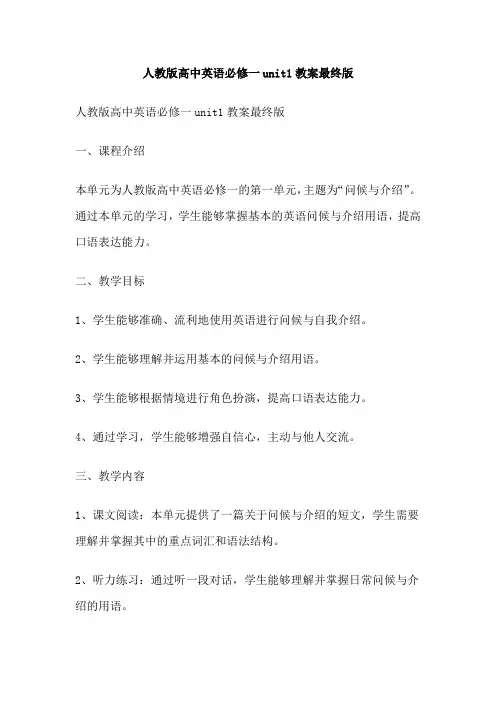
人教版高中英语必修一unit1教案最终版人教版高中英语必修一unit1教案最终版一、课程介绍本单元为人教版高中英语必修一的第一单元,主题为“问候与介绍”。
通过本单元的学习,学生能够掌握基本的英语问候与介绍用语,提高口语表达能力。
二、教学目标1、学生能够准确、流利地使用英语进行问候与自我介绍。
2、学生能够理解并运用基本的问候与介绍用语。
3、学生能够根据情境进行角色扮演,提高口语表达能力。
4、通过学习,学生能够增强自信心,主动与他人交流。
三、教学内容1、课文阅读:本单元提供了一篇关于问候与介绍的短文,学生需要理解并掌握其中的重点词汇和语法结构。
2、听力练习:通过听一段对话,学生能够理解并掌握日常问候与介绍的用语。
3、口语表达:学生需要进行多次口语练习,包括个人介绍、两人对话、小组讨论等,提高口语表达能力。
4、写作训练:学生需要写一篇关于自己或他人的介绍文章,巩固所学知识。
四、教学步骤1、导入新课:通过简单的问候,引导学生进入本单元的主题。
2、讲解新词:学习本单元的新单词,包括生词、词组和习惯用法。
3、课文阅读:阅读本单元提供的短文,并回答相关问题。
4、听力练习:听一段对话,并回答相关问题。
5、口语表达:进行多次口语练习,包括个人介绍、两人对话、小组讨论等。
6、写作训练:写一篇关于自己或他人的介绍文章。
7、复习巩固:回顾本单元所学内容,加深印象。
五、教学评价1、课堂提问:通过提问,检测学生对本单元重点内容的掌握情况。
2、小测验:进行小测验,检测学生对本单元重点词汇、语法和习惯用法的掌握情况。
3、课后作业:布置课后作业,让学生巩固本单元所学内容。
六、教学反思1、成功之处:通过多种教学方法的运用,本节课取得了良好的教学效果,学生积极参与,课堂氛围热烈。
2、不足之处:部分学生的口语表达能力还有待提高,需要加强针对性的训练。
3、改进措施:针对学生的不足,制定个性化的教学方案,加强针对性的训练,提高学生的口语表达能力。
高一英语必修一教案(优秀5篇)
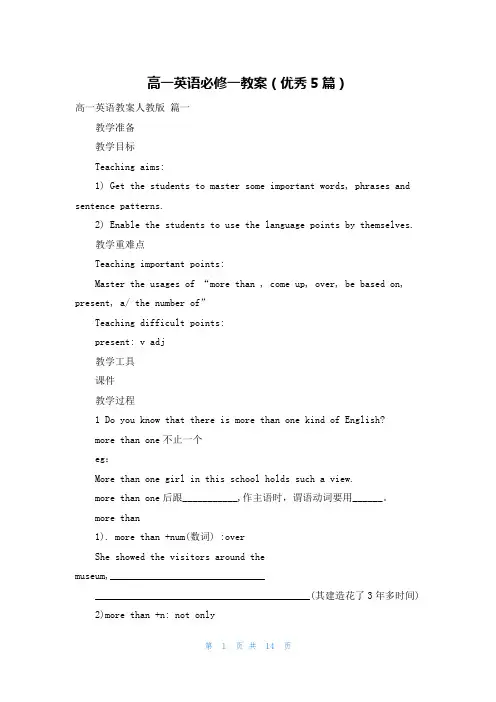
高一英语必修一教案(优秀5篇)高一英语教案人教版篇一教学准备教学目标Teaching aims:1) Get the students to master some important words, phrases and sentence patterns.2) Enable the students to use the language points by themselves.教学重难点Teaching important points:Master the usages of “more than , come up, over, be based on, present, a/ the number of”Teaching difficult points:present: v adj教学工具课件教学过程1 Do you know that there is more than one kind of English?more than one不止一个eg:More than one girl in this school holds such a view.more than one后跟___________,作主语时,谓语动词要用______。
more than1). more than +num(数词) :overShe showed the visitors around themuseum,__________________________________________________________________________(其建造花了3年多时间) 2)more than +n: not onlyMusic is more than just a sound--- it’s a way of thin king.3) more than +adj/v : very听到这个消息我很高兴。
人教版必修一英语教案
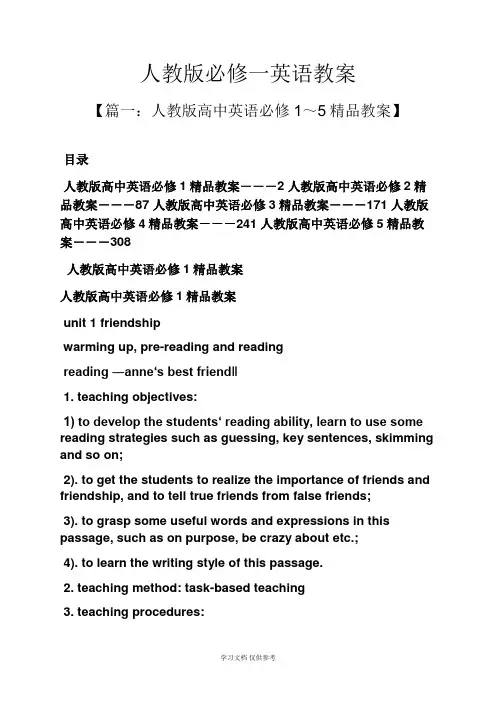
人教版必修一英语教案【篇一:人教版高中英语必修1~5精品教案】目录人教版高中英语必修1精品教案---2 人教版高中英语必修2精品教案---87 人教版高中英语必修3精品教案---171 人教版高中英语必修4精品教案---241 人教版高中英语必修5精品教案---308人教版高中英语必修1精品教案人教版高中英语必修1精品教案unit 1 friendshipwarming up, pre-reading and readingreading ―anne‘s best friend‖1. teaching objectives:1) to develop the students‘ reading ability, learn to use some reading strategies such as guessing, key sentences, skimming and so on;2). to get the students to realize the importance of friends and friendship, and to tell true friends from false friends;3). to grasp some useful words and expressions in this passage, such as on purpose, be crazy about etc.;4). to learn the writing style of this passage.2. teaching method: task-based teaching3. teaching procedures:1. please enjoy three pieces of music and find out what they are about.2. does a friend always have to be a person? what else can be your friend?3. what do you know about the world war ii?4. background introductionstep 2 fast reading1. who is anne?who/what was anne‘s best friend?when and where did the story happen?1. answer the following questions:ade her diary her best friend?what is an ordinary diary like according to anne? what about her diary?why was she so crazy about things to do with nature?why did she stay awake on purpose until very late one evening?why didn‘t she dare open the window when the moon was too bright?how do you understand the expressions ―spellbound‖and ―held me entirely in their powder‖?2. reading to summarise the main idea of each paragraph.skim the text and summarise the main idea of each paragraph in one sentence.four students a group to discuss the situation:suppose you four have to hide yourselves for 3 months. during the three months, you will be offered the basic food, water and clothes. your group can take 5 things with you.what will you take? why?how will you spend the 3 months?how will you treat each other and make friends ?step 6. homework1. review the important words, phrases and difficult sentences in the text and make sentences using the words given by the teacher.2. finish ex.1-3 on p4.unit 1 friendshipvocabulary and useful expressionslearning about languageteaching aims:1. to discover and learn to use some words and expressions.2. to enable students to rewrite sentences using direct or indirect speech3. to learn more information about anne.4. to cultivate the spirit of cooperation, self-teaching and self-exploring.teaching procedures:step 1 revision1. review something about ―anne‘s best friend‖ by using some true-or-false sentences1) a friend would laugh at you. f2) anne lived in amsterdam in the netherlands during world war ii. t3) she and her family hid away for one year before they were discovered. f5) she was fond of nature. t2. collect the sentences students think wonderful or difficult to understand.sample sentences1) she and her family hid away for nearly twenty-five months before they were discovered.2) i wonder if it‘s because i haven‘t been able to be outdoors for so long that i‘ve grown so crazy about everything to dowith nature.3) there was a time when a deep blue sky, the song of the birds, moonlight and flowers could never have kept me spellbound.4) the dark, rainy evening ,the wind, the thundering clouds held me entirely in their power.5) it was the first time in a year and a half that i‘d seen the night face to face.step 2 language points1. grow crazy about sth.对…狂热,痴迷be crazy about …eg. my cousin grows crazy about computer games.2. go through1). to examine carefully 仔细阅读或研究i went through the students‘ papers last night.2). to experience 经历,遭受或忍受you really don‘t know what we went through while working on this project.3.stay v. to continue to be in a particular state or situatioin系动词,表是状态。
英语人教版高中必修一(新课标)教案Unit1 Listening and Talking 教案
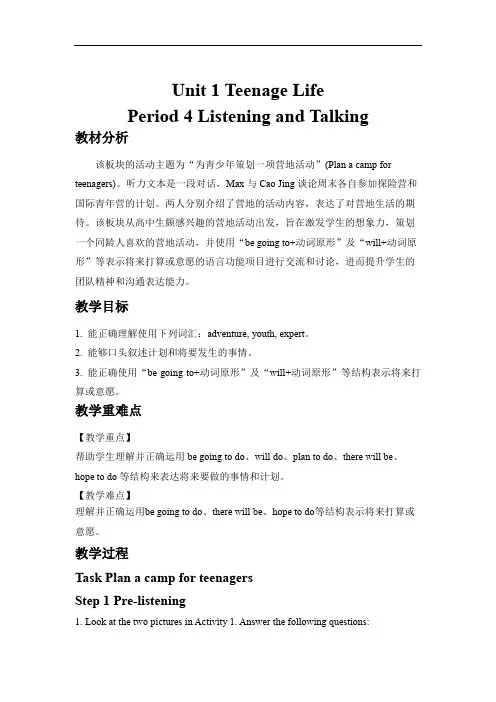
Unit 1 Teenage LifePeriod 4 Listening and Talking教材分析该板块的活动主题为“为青少年策划一项营地活动”(Plan a camp for teenagers)。
听力文本是一段对话,Max与Cao Jing谈论周末各自参加探险营和国际青年营的计划。
两人分别介绍了营地的活动内容,表达了对营地生活的期待。
该板块从高中生颇感兴趣的营地活动出发,旨在激发学生的想象力,策划一个同龄人喜欢的营地活动,并使用“be going to+动词原形”及“will+动词原形”等表示将来打算或意愿的语言功能项目进行交流和讨论,进而提升学生的团队精神和沟通表达能力。
教学目标1. 能正确理解使用下列词汇:adventure, youth, expert。
2. 能够口头叙述计划和将要发生的事情。
3. 能正确使用“be going to+动词原形”及“will+动词原形”等结构表示将来打算或意愿。
教学重难点【教学重点】帮助学生理解并正确运用be going to do、will do、plan to do、there will be、hope to do等结构来表达将来要做的事情和计划。
【教学难点】理解并正确运用be going to do、there will be、hope to do等结构表示将来打算或意愿。
教学过程Task Plan a camp for teenagersStep 1 Pre-listening1.Look at the two pictures in Activity 1. Answer the following questions:(1)What kind of camp is Adventure Camp/International Youth Camp?(2)What activities will it include?(3)What can students learn in these activities?2.Read the sentences in Activity 1. Then predict the main idea of the conversation. Step 2 While-listening1. Work on Activity 1. Listen to the conversation and tick what are heard about the camps.2.Work on Activity 2. Underline the expressions in the sentences above that Cao Jing and Max use to talk about the future.设计意图:该环节让学生通过勾画听力文本中的目标结构,关注对话中如何表达将来要做的事情和计划。
人教版高中英语必修一全套教案
Unit 2 English Around the WorldI Teaching aims1.Knowledge aim2.Master the words and phrases and get a view of the road to modern English.3.Ability aim4.Train students’ reading skill.5.Emotion aim6.Let students know more about English and inspire students to study English hard. IITeaching important pointsThe understanding and comprehension of the passage.III Teaching difficult pointHow to get to master the useful words and expressions.How to improve students’ ability to read an article.IV Teaching ProceduresV Teaching TimeSeven Periods.Period 1 Warming up and ReadingStep1. Warming up1. Lead in: Show Ss a map of the world, and ask them the following questions:1) How many languages are there in the world?2) How many English-speaking counties are there in the world?3) How are you ever heard some differences between American English and BritishEnglish?Step2. Reading(1)SkimmingRead the passage quickly and find out the answers of the questions in comprehension.(2)Scanning(3)Listen to the tape and tell the meaning of each paragraph.1. Para1: Brief introduction of the change in English.2. Para.2: An example of different kinds of English.3. Para3: The development of English.Para4: English spoken in some other countries.(4)Post readingStep3. DiscussionSome people say that Chinese is a much more elegant language, so it is more important for us to master it and it is not so necessary to master foreign language. Do you agree with this opinion and why?Period 2 Language pointsLanguage points:1. Do you know that there is more than one kind of English in the world?你知道世界上英语的种类并不止一种吗?more than one +名词单数,后面的谓语动词用单数例如:More than one student wants to go to swim.2.In some important ways they are very different form one another.在某些重要的方面,它们彼此有些差异。
高中英语新课标人教版教案必修一
高中英语新课标人教版教案必修一一、教学内容本节课选自高中英语新课标人教版必修一,具体章节为Unit 1 "My First Day at Senior High"。
教学内容主要包括:了解并描述学生在高中第一天的生活和感受;学会使用一般过去时描述过去的事件;掌握本节课的核心词汇和短语。
二、教学目标1. 能够听懂并准确说出与高中生活相关的词汇和短语。
2. 能够运用一般过去时描述过去的事件,提高语言运用能力。
3. 能够通过小组合作,交流并分享自己在高中第一天的经历和感受。
三、教学难点与重点1. 教学难点:一般过去时的运用,特别是动词过去式的变化规则。
2. 教学重点:核心词汇和短语的掌握,以及运用一般过去时进行简单的叙述。
四、教具与学具准备1. 教具:多媒体教学设备、黑板、粉笔、单词卡片。
2. 学具:英语课本、笔记本、字典。
五、教学过程1. 导入:通过播放一段关于高中生活的视频,引导学生关注本节课的主题。
2. 新课内容展示:展示本节课的核心词汇和短语,让学生跟读并模仿。
3. 例题讲解:以"Yesterday was my first day at senior high. I"为例,讲解一般过去时的用法。
4. 随堂练习:让学生运用一般过去时,描述自己在高中第一天的经历。
5. 小组活动:学生分成小组,互相交流并分享自己的经历,提高语言表达能力。
六、板书设计1. 核心词汇和短语:写在黑板的左边,方便学生查看。
2. 一般过去时的结构:写在黑板的右边,突出教学重点。
七、作业设计1. 作业题目:请用一般过去时描述你昨天的一天。
2. 答案示例:Yesterday was my busy day. I got up at 6:00, had breakfast and went to school. In the morning, I had four classes. After lunch, I played basketball with my friends. In the evening, I did my homework and watched TV.八、课后反思及拓展延伸1. 课后反思:本节课学生对于一般过去时的掌握程度较好,但仍有个别学生动词过去式变化不准确,需加强练习。
新课标人教版高中英语必修一全部教学案
新课标人教版高中英语必修一全部教学案一、教学目标1. 通过研究本单元的教学内容,帮助学生掌握必修一中的英语知识和技能。
2. 培养学生的英语听、说、读、写的综合能力。
3. 培养学生的团队合作意识和自主研究能力。
二、教学内容教学内容包括以下几个方面:1. 语法:复和巩固现在时态、过去时态、将来时态等基本语法知识。
2. 词汇:通过阅读和听力练,掌握本单元中的重点词汇和短语。
3. 阅读:通过阅读文本和相关的阅读理解题目,培养学生的阅读理解能力。
4. 听力:通过听对话和听文章练,提高学生的听力能力和听觉理解能力。
5. 口语:通过各种口语练,提高学生的口语表达能力。
三、教学方法1. 任务型教学法:通过让学生完成一系列任务,激发学生的研究兴趣,加强学生的实际运用能力。
2. 合作研究法:引导学生在小组内进行合作研究,促进学生之间的互动和交流。
3. 归纳法:通过教师引导和学生参与,将教学内容进行总结和归纳,提高学生的研究效果。
四、教学步骤1. 导入:通过引入生活例子或相关资料,唤起学生对新学知识的兴趣。
2. 语法讲解:教师通过讲解和示范,介绍本单元的语法知识。
3. 词汇研究:通过词汇游戏和词汇练,帮助学生记忆和掌握本单元的重点词汇。
4. 阅读训练:教师通过指导学生阅读文本和做阅读理解题目,提高学生的阅读理解能力。
5. 听力训练:教师播放相关听力材料,学生进行听力训练和听觉理解练。
6. 口语练:教师引导学生进行口语练,提高学生的口语表达能力。
7. 总结归纳:教师对本节课的教学内容进行总结和归纳。
8. 作业布置:教师布置相应的作业,巩固学生对本节课的研究。
五、教学评价1. 教师根据学生的课堂表现、作业完成情况和考试成绩等,进行教学评价。
2. 学生之间进行互评,促进学生之间的交流和研究成长。
六、教学资源1. 教材:新课标人教版高中英语必修一教材。
2. 多媒体设备:投影仪、电脑、音响设备等。
3. 课外资料:相关的练册、参考书和教育软件等。
人教版高中英语必修1全部教案设计
Unit 1 Friendship 1.Teaching aims and demands语法直接引语和间接引语(1):陈述句和疑问句陈述句“I don ' want to set down a series of facts in a diary.Said Anne.-- Anne said that shedidn ' Want to set down a series of facts in a diary.一般疑问句He asked Are you leaving tonigh?”---He asked us whether we were leaving that night.特殊疑问句“ When did you go to b edast nigh?” fathe said to Anne.---Father asked Anne when she went to bed the night before.1)Suggested teaching notes2). Analyses of the teaching contentsThis unit is about friendship, and nearly all the teaching materials center on it.Warming up---The questionnaire leads students to think and talk about friendship, get to know the problems between friends and seek solutions, which makes preparations forthe further teaching in topics, background and vocabulary.Pre-reading---The questions prompt students to think critically about friends and friendship in reality, alerting them to the fact that besides people, a diary can be afriend, too.Reading--- The diary by the Jewish girl Anne gave a glimpse of her life during her family ' s shelter in Amsterdam from the GermanNazis ’ lkliing in world war 2. she treats the diary as her best friend, and init revealsher longing for a normal life and close contact with nature, which helpsher get through the days.Comprehending---It helps students further understand the text by doing multiple choices, questions and answers, and matching.Learning about language---It teaches the important expressionsand structures andgrammar: direct and indirect speeches.Using language---The two letters, listening, questionnaire design, letter writing and fun writing prepares students to further talk about friendship, especiallythe problems with misunderstanding, and unfriendliness, thusstrengthening students ’ abilities to practice language, discover, and solveproblems.Summing up---It summarizes the whole contents of this unit from the aspects of topics, vocabulary and grammar.Learning tip--- This part encourages students to form the habit of writing a diary.Integrating skills--- The text introduces the way Hawaiians express friendship, to get students to realize the cultural differences in the values of friendship in additionits importance in all cultures.3)Making of the teaching planThis unit centers on friends and friendship, exploring different types of friendshipwith particular attention to that one can develop with oneself, i.e., the comfort andsupport one seeks from an imaginary friend. Students are expected to come to be trulyaware of the qualities and conducts that make a good friend, display and develop the ability to cope with misunderstanding, conflicts and problems related to friendship, and give advice on it. The concept that even an ordinary thing can be a friend should break down the traditional belief in the interpersonal nature of friendship. Also, the comparison of similarities dissimilarities in friendship comprehension between the East and the West leads students to know better the values of friendship in Westerns eyes. All in all, this unit promises to unveil the true essence of friendship and helps students to lead a more friendly and harmonious life. Thus, based on the theme, contents and teaching objectives, the whole teaching procedures can fall into five periods as follows:4)Teaching plans for each periodPeriod 1 Warming-up and Speaking1.Teaching objectives:1)Target languageI (don ' t) think ...... I (don ' t) think so. I (don ' t) agree.I believe ............. That ' s correct. In my opinion, ••2)Ability goalsa.Describe your friends in Englishb.Figure out the problems between friends and then find different ways to solve theproblems.3)Learning ability goalsa.To encourage students to think and talk about friends and friendship by using somephrases and structures.b.To learn to solve problems that may occur between friends.c.To cultivate the students to form the good habit of learning English in Senior MiddleSchool.2.Teaching important points:e the given adjectives and sentence structures to describe one of your friends.b.Learn to evaluate friends and friendship.3.Teaching difficult points:a.Work together with partners and describe one of your good friends.b.Discuss with partners and find out ways to solve the problems.4.Teaching methodsa.Task-based teaching and learningb.Cooperative learningc.Discussion5.Teaching aids:CAI6.Teaching procedures and ways:Step 1 Lead-in and Warming-upBefore the lesson, the teacher can arousethe students ’interests by showing a video of Auld Lang Syne.At the beginning of the first class, we can get the students to talk about their summer holidays. The students can talk freely as they like.1.How did you spend your summer holidays? How did you feel? What did you do inyour summer holidays? What did you do in your spare time?2.What do you think of our new school? Do you like it? Could you say somethingabout it?3.Do you like making friends? How do get in touch with your friends? Do you havemany friends? Where are they now? Do you have any old friends in our school?Have you made any new friends in our class?Step 2 Think it over1.Give a brief description of one of your friends. The following phrases and structuresmay be helpful:His/Her name is .........He /She is ....... years old.He / She likes ....... and dislikes .......He /She enjoys ......... and hates .....He /She is very kind/friendly/ ...When /Where we got to know each other.2.What types of friendship do you have?Pleasetick them out. Then fill in the blanks.girl friends boy friends pen friendslong -distance friends friends of the same agee-friends (friends over the internet) friends across generations unusual friends like animals, books ...1). _____is /are most important to you.2). You spend most of your free time with .3). You will share your secrets with .4). When in trouble, you will first turn to .Step 3 Make a survey1. List some qualities of a good friend or your ideal friend. Have the students get into groups of four to find out what each has listed.Tell your partner your standards of good friends by using the following structure:I think a good friend should (not) be ...In my opinion, a good friend is someone who ...1.Have a member of each group report on what their lists have in common and list them on theboard.2.Ask the class whether or not they agree with all the qualities listed.3.Then have the students do the survey in the textbook.4.Have the students score their survey according to the scoring sheet on page 8.5.The teacher ask some students how many points they got for the survey and assesstheir values of friendship:★4~7 points: You are not a good friend. You either neglect your friendor just do what he/she wants you to do. You should think more about what a good friend needsto do.★8~12 points: You are a good friend but you sometimeslet your friendship become too important, or you fail to show enough concern for your friend feelings. Try to strike a balance between your friend ' needs and your own responsibilities.★13+ points: You are an excellent friend who recognizes that to be a good friend you need balance your needs and your friend ' s. Well done.(You may also show your students the results above and let themselves self-reflect upon their own values of friendship)Step 4 Talking and sharing (work in pairs)1.If your best friend does something wrong, what will you do?Try to use the following phrases:I (don ' t) think ...... I (don ' t) think so.I (don ' t) agree. I believe ............That ' s correct. In my opinion, ........2.A British newspaper once offered a prize for the best definition(义)of a friend. If youwere the editor, choose the best one from the following entries保目),and explain why.One who understands my silence.A friend in need is a friend indeed.Friends are just the people who share your happiness and sorrow. When you look at your watch at 4 am, but still know you can call them and wake them up, and they still want to talk to you, that friendship. To' have a friend, you need to be a good friend.Step 5 Group work (output)The teacher can give each group one of these questions below to talk about. Then let the class sharetheir ideas. It ' better to stimulate the students to expresstheir own opinions about these questions.1.Do you think it is a good idea to borrow money from your friend?Why and Why not?2.What factors may cause the breakdown of a good friendship?3.What can be your unusual friend besides human beings? And why?Step 6 Homework1.Write down a short passage about your ideas /the factors/your unusual friends.2.Prepare for the new lesson.Period 2 Reading Anne ’ s Best Friend1.Teaching objectives:1)To develop the students r’ eading ability, learn to use some reading strategies such asguessing, key sentences, skimming and so on;2). To get the students to realize the importance of friends and friendship, and to telltrue friends from false friends;3). To grasp some useful words and expressions in this passage, such as on purpose, be crazyabout etc.;4). To learn the writing style of this passage.2.Teaching method: Task-based teaching3). Teaching procedure:Step 1.Pre-reading1.Please enjoy three pieces of music and find out what they are about.2..Why do you think friends are important to you?3.What do you think a good friend should be like? List the good qualities a good friendshould have.4.Have you ever considered making friends with animals, plants or even an object?Why or why not?Step 2.Reading1.Try to guess what Anne ’ s friend is and what the passage is about by reading the titleand having a quick at the pictures in this passage without reading it.2.Skimming the first two paragraphs to confirm your guessing.1)What was Anne ’ s best friend? Why did she make friends with it?2)Did she have any other true friends then? Why?3)What is the difference between Anne ’ s diary and those of most people?4)Do you keep a diary? What do you think most people set down in their diaries?5)We are going to read one of Anne ’ s diaries .but before reading ,can you tell me what the diary is about with the help of one key sentence in the 2nd paragraph?3.Reading of Anne ’ s diaryHow she felt in the hiding placeTwo examples to show her feelings thenStep 3.Post-reading1.What would you miss most if you went into hiding like Anne and her family? Giveyour reasons.2.Group workWork in groups to decide what you would do if your family were going to be killedjust because they did something the Emperor did not like.Where would you plan to hide?How would you arrange to get food given to you every day?What would you do to pass the time?3.Discovering useful words and expressionsComplete the following sentences, using words and expressions from Reading1)She has grown ________ about computer games.2)Was it an accident or did David do it on ___ ?3)From the beginning ,Paul made it clear that he would be ____ (完全地)incontrol.4)He used to work ______ even in the middle of winter.5)Just the _____ of more food made her feel sick.6)You had better have a ________ talk with him.7)Born in a poor family, the manager _______ lots of hardships in his childhood.8)A diary is often kept to _____ what happenins people ’ s daily lives.Step 4.Talking about friends and friendship1.T here are many proverbs about friends and friendship. Choose the one you agree with and explain why, then choose one you disagree with and explain why.A friend in need is a friend indeed.Friends are like wine; the older, the better.A friend to all is a friend to none.The same man cannot be both friend and flatterer僦奉承者).False friends are worse than open enemies.Walking with a friend in the dark is better than walking alone in the light.2.W e have talked about friends and friendship today, can you write one or two sentences to express your understanding of friends and friendship.Step 5.Homework:1.I nterview a high school student, a businessman, a police officer and a housewife to findout their opinions about friends and friendship. Write a report to share itwith the whole class.2.Describe one of your best friends following the writing style of this passage.Ending: Let ’ s sing this song about friends togetherPeriod 3 Grammar1..Teaching objectivesLearn to use direct speech and indirect speech2.Teaching important pointSummarize the rules of Direct Speech and Indirect Speech.3.Teaching difficult pointLearn about the special cases in which the tenses shouldn ed. ’ t be chang4.Teaching methodsDiscussing, summarizing and practicing.5.Teaching proceduresStep1 Lead inT: In the last lesson, we learned Anne Frank ’ s story. She is telling herstories to twher friends—you and Tom. Tom has something wrong with his ears, so you have to repeat Anne ’ s sentences, using indirect speech. Sometimes you explain Tom sentences to Anne.“I have to stay in the hiding place." said Anne. —Anne said she had to stay in the hiding place.“ Do you feel sad when you are not able to go outdoors? ” Tom asked Anne.Tom asked Anne if/whether she felt sad when she was not able to go outdoors.I don ’ t want to set down a series of facts in a diary, said Anne.Anne said that she didn ’ t want to set down a series of facts in a diary.“What do you call your diary?” Tom asked. —Tom asked what she called her diary.Ss go on this topic by themselves.Step 2 GrammarT: Now let ’ s look at these sentences again. If we want to change Direct Speech into Indirect Speech, what should be changed?Ss discuss by themselves.Ss: sentence structures, tenses, pronouns, adverbials of time and place and verbs should be changed.T: Quite right. Look at the form on the screen. These are the rules.直接引语变成间接引语时,要注意以下几点:人称变化、时态变化、宾语从句要用陈述句语序。
- 1、下载文档前请自行甄别文档内容的完整性,平台不提供额外的编辑、内容补充、找答案等附加服务。
- 2、"仅部分预览"的文档,不可在线预览部分如存在完整性等问题,可反馈申请退款(可完整预览的文档不适用该条件!)。
- 3、如文档侵犯您的权益,请联系客服反馈,我们会尽快为您处理(人工客服工作时间:9:00-18:30)。
人教版英语必修一教案【篇一:人教版高中英语必修1全册~5全册教案】新课标高中英语1(必修)教学设计与案例unit 1(1) 课题:friendship(2) 教材分析与学生分析:本单元的中心话题是“友谊”,几乎所有的内容都是围绕这一中心话题展开的。
warming up部分以调查问卷的形式引导学生了解日常生活中朋友之间发生的真实问题以及解决这些问题的方法;pre-reading部分的几个问题启发学生对“友谊”和“朋友”进行思考,使学生明确不仅人与人之间可以做朋友,日记也可以成为人们的朋友;reading部分anne‘s best friend以日记形式讲述了犹太女孩安妮的故事;comprehending部分通过连句、多项选择和问答形式帮助学生对课文内容、细节进行更深入的理解; using about language 部分教学本课重点词汇和重点语法项目。
(3) 课时安排:the first period: speaking: warming up and pre-reading the second period: readingthe third period: grammarthe forth period:listeningthe fifth period: writing(4)教学目标:①知识与技能:talk about friends and friendship; practise talking aboutagreement and disagreement, giving advice and making decisions; use directspeech and indirect speech; learn to write an essay to express and supportan opinion.②过程与方法:本单元在读前阶段就提出问题,让学生思考是不是只有人与人之间才能交朋友,然后在阅读中通过安妮的日记向学生说明我们也可以与动物及无生命的日记交朋友。
在深刻理解、充分训练的基础上,可以再引导学生深入讨论几个与本单元话题有关的问题:1.描述朋友; 2. 结交网友;3. 观点交流;4. 善\不善交朋友; 5. 朋友的重要性。
③情感态度与价值观:学完本单元后要求学生进行自我评价,主要评价自己在本单元中的学习情况。
对书中的内容是否感兴趣,有哪些收获,解决了什么问题。
使学生加深对友谊、友情的理解,以及如何正确交友,处理朋友之间发生的问题等。
(5) 教学重点和难点:词汇:add point upset ignore calm concern cheat share reason listseries crazy nature purpose dare thunder entirely poweraccording trust suffer advice situation communicatehabit短语: add up calm downhave got to be concerned about go throughhide away set down on purpose in order to face to faceaccording toget along withfall in lovejoin in重点语法项目:直接引语和间接引语的互相转换难点:understand the real meaning of friends and friendship; discuss the answers to the questions (reading);how to teach the ss to master the usage of direct speech and indirectspeech(statement and questions).(6) 教学策略: discussion, student-centered vocabulary, learning, listening, pairwork, teach grammar in real situation(7) 教学煤体设计: a projector and a tape recorder.(8) 教学过程:详见以下分课时教学设计。
(9) 课堂练习与课外作业设计:穿插于分课时教学设计中(10)教学反思或值得改进的地方:见每个课时最后部分。
period one:speaking (warming up and pre-reading) aims talk about friends and friendship.practise talking about agreement and disagreement.step i revisionask some of the students to read his / her composition for the class, describing one of the problems between friends and how it is solved. then give some comments. t: now, lets check up your homework for last class. id like some of you to read his / her composition for the class, describe one of the problems between friends and how it is solved.step ii warming upt: / think most of us have some good friends. do you know why people make friends with one another?step iii talking(wb p41)first get the students to listen to what a canadian say about making friends. then ask them to discuss the two questions.t: now were going to listen to what leslie clark, a canadian has got to say about making friends. after listening, please talk about the two questions in groups of 4. try to use the following expressions.1 do you agree with her?2 what do you think of people from foreign countries?agreement disagreementi think so,i dont think so.i agree. i dont agreethats correct. of course not.thats exactly my opinion. im afraid not.youre quite right.i dont think you are right.step iv speaking(b p6)first, get the students to think of four situations among friends in groups of 4 and design a questionnaire to find out what kind of friends their classmates are. second, try it out on their own group, checking the questionnaire through and adding up their score and see how many points they can get. ask them to fill in the form prepared before class. show the instructions and decide what kind of friends their classmates are. third, ask each student to stand up and walk around the classroom to make a survey on four of other classmates. show the instructions and decide what kind of friends other classmates are. they can share your questionnaire with one or two other groups and try each others questionnaires.t: friends come in many flavors. there are best friends, school friends, fair-weather friends, forever friends and many more.do you want to know what kind of friends your classmates are? now lets make a survey. first, please think of four situations among friends and design a questionnaire to find out whatkind of friends your classmates are.1. your friend borrowed 100 yuan from you last week andhasnt returned it. you willa. ask him / her to pay back as soon as possible; or youll end the friendship.b. ask him / her to pay back if he / she has.c. tell him / her not to return it.2. your friend said your bad words behind you. you willa. ask him / her to say sorry to you , or youll stop your friendship.b. excuse him / her and forget it.c. ask others to tell him / her that he/she is wrong.3. you promised to meet your friend at five oclock but your parents ask you to do homework at home. you willa. tell him your parents ask you to do homework at home.b. tell him / her a lie that you are ill.c. say sorry to him / her and plan to meet him / her another time.4. you borrowed a bike from your friend, but you had it stolen. you willa. buy a new one which is the same as his / hers.b. just tell him / her you had it stolen.c. say sorry to him/her and buy him/her an old oneafter they finish choosing the answers, show the scoringsheet on the screen. scoring sheet1 ao b2 c63 a2 bo c3 2 al b64 a6 bl c2 c2instructions:2-5 a fair-weather friendonly like them when they are happy and popular. if they are feeling down, or if they are having a problem, you dont want to spend time or talk with them. you dont help your friends when they have problems. you are always thinking about yourself.you should care more about your friends. if you continue to be self-centered and dont consider others feelings, you wontmake more friends and keep friendship for long. 6-11 a school friendyou see each other in school. you just study and play with them together in school. you may not know everything about each other. you take things smoothly. you seldom hurt your friends with your benefit considered. youd better add more affection to your friends. friendship is about feelings and we must give as much as we take.12-17 a best friendyou do everything together with your friends: study, read, watch tv, surf the internet, play sports and listen to music. if either one has a problem, the other is there to help.you know your friends very well. you understand and yield to each other. you help with each other and improve together. you have a lot of common benefit. your friendship is good to both of you. you are mutually beneficial.18-21 forever friendyou will always listen to your friends and try to help them, even if you disagree or if you are having a problem. whenever they have any difficulty, youll try your best to do what you can to help them without hesitation. you devote yourself to your best friends. you are willing to lose what you have, even your life.课后反思:本课教学设计容量和密度较大,但难度适中,大部分学生都能接受。
